21世纪大学实用英语 (U版)Unit1
21世纪大学实用英语综合教程(第二册)课文翻译及课后习题答案unit-1
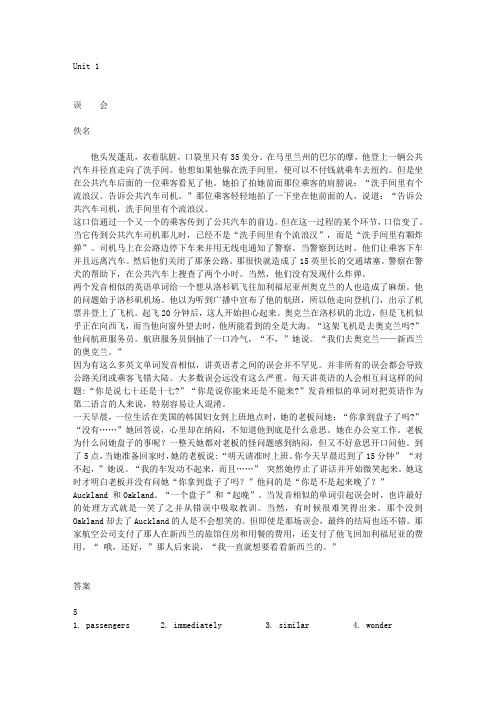
Unit 1误会佚名他头发蓬乱,衣着肮脏,口袋里只有35美分。
在马里兰州的巴尔的摩,他登上一辆公共汽车并径直走向了洗手间。
他想如果他躲在洗手间里,便可以不付钱就乘车去纽约。
但是坐在公共汽车后面的一位乘客看见了他。
她拍了拍她前面那位乘客的肩膀说:“洗手间里有个流浪汉。
告诉公共汽车司机。
”那位乘客轻轻地拍了一下坐在他前面的人,说道:“告诉公共汽车司机,洗手间里有个流浪汉。
这口信通过一个又一个的乘客传到了公共汽车的前边。
但在这一过程的某个环节,口信变了。
当它传到公共汽车司机那儿时,已经不是“洗手间里有个流浪汉”,而是“洗手间里有颗炸弹”。
司机马上在公路边停下车来并用无线电通知了警察。
当警察到达时,他们让乘客下车并且远离汽车。
然后他们关闭了那条公路。
那很快就造成了15英里长的交通堵塞。
警察在警犬的帮助下,在公共汽车上搜查了两个小时。
当然,他们没有发现什么炸弹。
两个发音相似的英语单词给一个想从洛杉矶飞往加利福尼亚州奥克兰的人也造成了麻烦。
他的问题始于洛杉矶机场。
他以为听到广播中宣布了他的航班,所以他走向登机门,出示了机票并登上了飞机。
起飞20分钟后,这人开始担心起来。
奥克兰在洛杉矶的北边,但是飞机似乎正在向西飞,而当他向窗外望去时,他所能看到的全是大海。
“这架飞机是去奥克兰吗?”他问航班服务员。
航班服务员倒抽了一口冷气,“不,”她说。
“我们去奥克兰——新西兰的奥克兰。
”因为有这么多英文单词发音相似,讲英语者之间的误会并不罕见。
并非所有的误会都会导致公路关闭或乘客飞错大陆。
大多数误会远没有这么严重。
每天讲英语的人会相互问这样的问题:“你是说七十还是十七?”“你是说你能来还是不能来?”发音相似的单词对把英语作为第二语言的人来说,特别容易让人混淆。
一天早晨,一位生活在美国的韩国妇女到上班地点时,她的老板问她:“你拿到盘子了吗?” “没有……”她回答说,心里却在纳闷,不知道他到底是什么意思。
她在办公室工作。
老板为什么问她盘子的事呢?一整天她都对老板的怪问题感到纳闷,但又不好意思开口问他。
21世纪大学英语读写教程第一册Unit1内容介绍
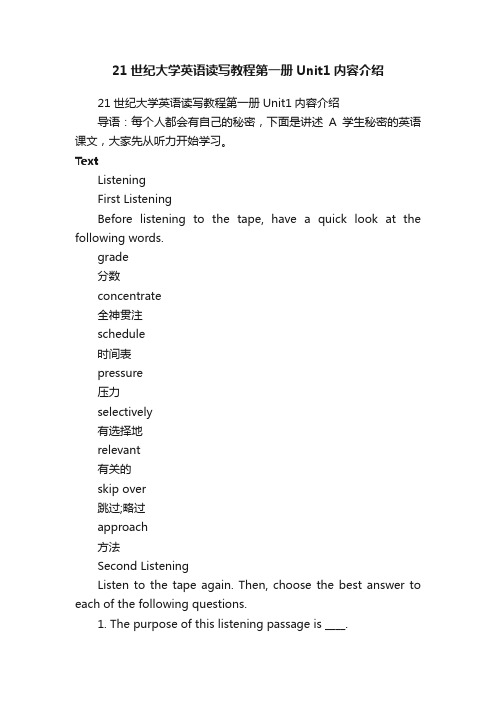
21世纪大学英语读写教程第一册Unit1内容介绍21世纪大学英语读写教程第一册Unit1内容介绍导语:每个人都会有自己的秘密,下面是讲述A学生秘密的英语课文,大家先从听力开始学习。
TextListeningFirst ListeningBefore listening to the tape, have a quick look at the following words.grade分数concentrate全神贯注schedule时间表pressure压力selectively有选择地relevant有关的skip over跳过;略过approach方法Second ListeningListen to the tape again. Then, choose the best answer to each of the following questions.1. The purpose of this listening passage is ____.A) to describe college lifeB) to give advice for college successC) to warn against being lazy at collegeD) to increase college enrollment(入学人数)2. According to the listening passage, the most important key to getting good grades at college is _____.A) asking questions in classB) doing assignments ahead of timeC) working as hard as you canD) learning how to study effectively3. Which of the following does the listening NOT say you should do?A) Organize your time and materials.B) Write down every word the professor says in class.C) Treat studying like business.D) Study together.Pre-reading Questions1. Based on the title, guess what the text is about.2. Look at the subheadings, 1-8, in the text. Which of these activities do you already do? In which areas do you feel you need improvement?3. Are there any "secrets" to your own success as a student? In other words, do you have any special study techniques which have been very successful for you?Secrets of A StudentsEdwin Kiester & Sally Valentine KiesterAlex, now a first-year student in natural sciences at Cambridge, played football for his school in Manchester and directed the school production of a play — but he left school with five A's. Amanda, studying English at Bristol University, acted inplays at her school and played tennis regularly. Yet she still managed to get four A's.How do A students like these do it? Brains aren't the only answer. The most gifted students do not necessarily perform best in exams. Knowing how to make the most of one's abilities counts for much more.Hard work isn't the whole story either. Some of these high-achieving students actually put in fewer hours than their lower-scoring classmates. The students at the top of the class get there by mastering a few basic techniques that others can easily learn. Here, according to education experts and students themselves, are the secrets of A students.1. Concentrate! Top students allow no interruptions of their study time. Once the books are open, phone calls go unanswered, TV unwatched and newspapers unread. "This doesn't mean ignoring important things in your life," Amanda explains. "It means planning your study time so that you can concentrate. If I'm worried about a sick friend, I call her before I start my homework. Then when I sit down to study, I can really focus."2. Study anywhere — or everywhere. A university professor in Arizona assigned to tutor underachieving college athletes, recalls a runner who exercised daily. He persuaded him to use the time to memorise biology terms. Another student stuck a vocabulary list on his bathroom wall and learned a new word every day while brushing his teeth.3. Organize your materials. At school, Tom played basketball. "I was too busy to waste time looking for a pencil or a missing notebook. I kept everything just where I could get my hands on it," he says. Paul, a student in New Mexico, keeps two folders for each subject —one for the day's assignments, the other forhomework completed and ready to hand in. A drawer keeps essentials together and cuts down on time-wasting searches.4. Organize your time. When a teacher set a long essay, Alex would spend a couple of days reading round the subject and making notes, then he'd do a rough draft and write up the essay. He would aim to finish a couple of days before the assignment was due so that if it took longer than expected, he'd still meet the deadline. Amanda stuck to a study schedule that included breaks every two hours. "Trying to study when you're overtired isn't smart," she advises. "Even a short break to stretch or get some fresh air can work wonders."5. Learn how to read. "I used to spend hours going through irrelevant material," Amanda remembers. "But then I got used to reading quickly; if the first sentence of a paragraph wasn't relevant, I'd move on to the next paragraph." "The best course I ever took," says an Oklahoma student, "was speed-reading. I not only increased my words per minute but also learned to look at a book's table of contents and pictures first. Then, when I began to read, I had a sense of the material and I retained a lot more." To such students, the secret of good reading is to be an active reader —one who keeps asking questions that lead to a full understanding of the material being read.6. Take good notes. "Before writing anything, I divide my page into two parts," says Amanda, "the left part is about a third of the page wide; the right, two-thirds. I write my notes in the wider part, and put down the main ideas on the left. During revision, this is very useful because you can see immediately why the material is relevant, rather than being worried by a great mass of information." Just before the end of lesson bell rings, most students close their books, put away papers, talk to friends andget ready to leave. But a smart student uses those few minutes to write two or three sentences about the lesson's main points, which he scans before the next class.7. Ask questions. "If you ask questions, you know at once whether you have got the point or not," says Alex. Class participation is a matter of showing intellectual curiosity. In a lecture on economics, for example, curious students would ask how the Chinese economy could be both socialist and market-driven, thus interesting themselves not only in whats, but also in whys and hows.8. Study together. The value of working together was shown in an experiment at the University of California at Berkeley. A graduate student there who observed a first-year calculus course found that Asian-American students discussed homework, tried different approaches and explained their solutions to one another while the others studied alone, spent most of their time reading and rereading the text, and tried the same approach time after time even if it was unsuccessful.After all, the secrets of A students are not so secret. You can learn and master them and become an A student, too.New Wordsperformvt. 执行, 完成; 演出, 表演vi. 演出, 表演; 工作, 表现; 执行, 完成high-achievinga. 得高分的lower-scoringa. 得分较低的concentratevi. direct all one's attention, etc. towards sth. 全神贯注;集中思想;专注;专心interruptionn. 打扰; 干扰; 中止; 阻碍ignorevt. take no notice of; refuse to pay attention to!! 不理;忽视focusv. direct attention, etc. on sth. 集中注意力于某事情assignvt. appoint to a job or duty 委派; 指派underachievinga. doing less well than was expected, esp. in school work 未能充分发挥学习潜力的;学习成绩不良的athleten. a person who is good at or who often does spors 运动员recallvt. bring back to the mind; remember 回想(起);记得memorise, -rizevt. learn and remember 记住;熟记missinga. 缺失的,找不到的;失踪的`,下落不明的notebookn. small book for writing notes in 笔记本;记事本foldern. 文件夹assignmentn. a duty or piece of work that is given to someone (指定的)作业;(分派的)任务drawern. 抽屉essentialn. (usu. pl.) sth. that is necessary or very important [常用复数] 必需品a. (to, for) necessary; central 绝对必要的;非常重要的essayn. a short piece of writing giving sb. 's ideas about politics, society, etc. 论说文; 散文draftn. the first rough written form of anything or a rough plan 草稿;草案vt. make a draft of 起草;草拟duea. expected or supposed (to happen, arrive, etc.) 到期的;预定应到的*deadlinen. a date or time before which sth. mush be done or completed 最后期限schedulen. a timetable for things to be done 时间表;日程安排表overtireda. 过度疲劳的stretchvi. 舒展身体,伸懒腰irrelevanta. (to) not having any real connection with or relation to sth. else 不相关的;不相干的relevanta. directly connected with the subject or problem being discussed or considered 相关的; 相干的speed-readingn. 快速阅读perprep.for each 每;每一contentn. 1.(pl.) a list in a book saying what the book contains [复数] 目录2.the subject matter, esp. the ideas, of a book, speech, etc. 内容retainvt. keep (possession of); avoid losing 保持;保留revisionn. 复习;修改scanvt. look at quickly without careful reading 浏览,扫视participationn. 参与;参加participatevi. (in) to take part or have a share in an activity or event 参与;参加intellectuala. of intellect 知识的;智力的n. 知识分子curiosityn. the desire to know or learn 好奇(心);求知欲economicsn. the scientific study of the way in which wealth is produced and used 经济学economyn. the system by which a country's wealth is produced and used 经济(制度)market-drivena. 市场驱动的graduatea. 研究生的vi. 毕业n. 有学位者,大学毕业生graduate student研究生calculusn. 微积分approachn. a manner or method of doing sth. or dealing with a problem 方式;方法v. come near or nearer to sb. or sth. 靠近;接近solutionn. an act or way of finding an answer to a difficulty or problem 解决(办法)Phrases and Expressionsmake the most ofget the best use or greatest gain from 充分利用count for much/littlebe of much/little worth or importance 很有 / 没有多少价值或重要性not the whole story/only part of the story不是全部情况 / 只是部分情况put inspend (time or money) 花费(时间或金钱)get (or lay) one's hands onfind; obtain 把… 弄到手hand ingive (sth.) to sb. in charge by hand; send in 交上;提交keep ... togethercause to remain together 把… 聚在一起cut down onreduce 减少stick tokeep to; not abandon or change 坚持;不放弃,不改变work wondersdo things that people did not think possible 创奇迹;产生奇妙作用go throughread from beginning to end; examine 从头至尾看;遍查lead tohave as a result; cause 导致;引起a couple oftwo; a few 两(个);两三(个)write upwrite in a complete form 写出,写成put downwrite down 写下put awayput (sth.) in its proper place 把(某物)收藏在合适的地方time after timeagain and again; repeatedly 一再;屡次Proper NamesEdwin Kiester埃德温·基斯特Sally Valentine Kiester莎莉·瓦伦丁·基斯特Alex阿历克斯(男子名)Cambridge剑桥(英格兰东南部城市, 剑桥大学所在地); 剑桥大学(=Cambridge University)Manchester曼彻斯特(英格兰西北部港市)Amanda阿曼达(女子名)Bristol布里斯托尔(英格兰西南部港市)Arizona亚利桑那州(美国州名)New Mexico新墨西哥州(美国州名)Oklahoma俄克拉荷马州(美国州名)California加利福尼亚州(美国州名)Berkeley伯克利(美国加利福尼亚州西部城市)。
21世纪大学实用英语(综合教程)第一册Unit1-6课文翻译与课后答案

21世纪大学实用英语(综合教程)第一册Unit1-6课文翻译与课后答案21世纪大学实用英语综合教程(第一册)Unit1~6课文翻译及课后答案第一单元Text A 大学——我一生中的转折点佚名作为一名一年级新生初进大学时,我害怕自己在学业上搞不好。
我害怕独自一人在外,因为我是第一次远离家人。
这里周围都是我不认识的人,而他们也不认识我。
我得和他们交朋友,或许还得在我要学的课程上跟他们在分数上进行竞争。
他们比我更聪明吗?我跟得上他们吗?他们会接受我吗?我很快就认识到,我的生活现在就取决于我自己了。
如果我要在学业上取得成功,我就必须制定一份学习计划。
我必须调整花在学习上的时间和花在社交上的时间。
我必须决定什么时候上床睡觉,什么时候吃什么,什么时候喝什么,对什么人表示友好。
这些问题我都得自己回答。
开始时,生活有点艰难。
我在怎样利用时间上犯了错误。
我在交朋友上花的时间太多了。
我还在怎样选择大学里的第一批朋友上犯了一些错误。
然而不久,我就控制住了自己的生活。
我做到了按时上课,完成并交上了第一批作业,而且以相当好的成绩通过了前几次考试。
此外,我还交了一些朋友,跟他们在一起我感到很自在,我能把我担心的事告诉他们。
我建立了一种真正属于我自己的常规——一种满足了我的需要的常规。
结果,我开始从一个不同的视角看待我自己了。
我开始把自己看作是一个对自己负责也对朋友和家人负责的人。
凡事自己做决定并看到这些决定最终证明是明智的决定,这种感觉很好。
我猜想这就是人们所说的“成长”的一部分吧。
我未来的生活将会怎样呢?在人生的这一阶段,我真的不能确定我的人生之路最终将会走向何方,我真的不知道在以后的几年中我会做什么。
但我知道,我能应对未来,因为我已经成功地跃过了我生命中的这一重要障碍:我已经完成了从一个依赖家人给予感情支持的人向一个对自己负责的人的过渡。
Practice 51. smart2. succeed3. shortly4. managed5. share6. fear7. responsible 8. however 9. enter 10. surrounded 11. handle 12. comfortablePractice 61. is up to2. keep up with3. under control4. at first5. grew up6. make friends with7. turned out8. as a result9. set up 10. in additionPractice 71. how to play the game2. whereI wanted to go3. whether they would accept him or not4. what to do and how to do it5. whom to love and whom not to6. when he made that decisionPractice 81. I see Li Ming as my best friend. We share the same hobbies and interests.2. They looked upon their math teacher as their best teacher.3. We think of this place as our home.4. They looked on their college life as their happiest years in their life.Practice 91. John is both smart and responsible. He likes to make friends with other people.2. I have made the decision to compete for the new post. You can compete for it, too.3. Shortly after the doctor came, he managed to have my father’s illness under control.4. As freshmen, most of us do not know what college life has in store for us, but we all know that we must do well in our studies.5. To succeed in college, we must keep up with the other students and set up a routine thatmeets out needs.6. Though the assignments last week turned out to be more difficult than I thought, I handed them in on time.Text B 我希望从大学教育中得到什么亚历克西斯·沃尔顿中学毕业后,我计划做几件事。
21世纪大学实用英语综合教程(第二册)课文翻译及课后习题答案unit1
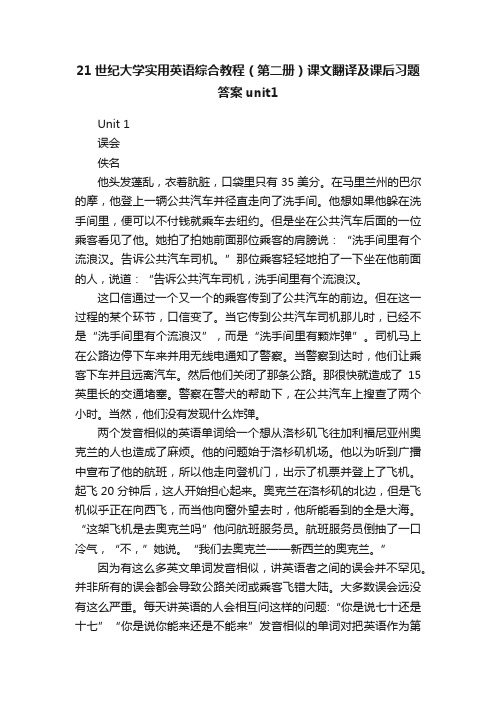
21世纪大学实用英语综合教程(第二册)课文翻译及课后习题答案unit1Unit 1误会佚名他头发蓬乱,衣着肮脏,口袋里只有35美分。
在马里兰州的巴尔的摩,他登上一辆公共汽车并径直走向了洗手间。
他想如果他躲在洗手间里,便可以不付钱就乘车去纽约。
但是坐在公共汽车后面的一位乘客看见了他。
她拍了拍她前面那位乘客的肩膀说:“洗手间里有个流浪汉。
告诉公共汽车司机。
”那位乘客轻轻地拍了一下坐在他前面的人,说道:“告诉公共汽车司机,洗手间里有个流浪汉。
这口信通过一个又一个的乘客传到了公共汽车的前边。
但在这一过程的某个环节,口信变了。
当它传到公共汽车司机那儿时,已经不是“洗手间里有个流浪汉”,而是“洗手间里有颗炸弹”。
司机马上在公路边停下车来并用无线电通知了警察。
当警察到达时,他们让乘客下车并且远离汽车。
然后他们关闭了那条公路。
那很快就造成了15英里长的交通堵塞。
警察在警犬的帮助下,在公共汽车上搜查了两个小时。
当然,他们没有发现什么炸弹。
两个发音相似的英语单词给一个想从洛杉矶飞往加利福尼亚州奥克兰的人也造成了麻烦。
他的问题始于洛杉矶机场。
他以为听到广播中宣布了他的航班,所以他走向登机门,出示了机票并登上了飞机。
起飞20分钟后,这人开始担心起来。
奥克兰在洛杉矶的北边,但是飞机似乎正在向西飞,而当他向窗外望去时,他所能看到的全是大海。
“这架飞机是去奥克兰吗”他问航班服务员。
航班服务员倒抽了一口冷气,“不,”她说。
“我们去奥克兰——新西兰的奥克兰。
”因为有这么多英文单词发音相似,讲英语者之间的误会并不罕见。
并非所有的误会都会导致公路关闭或乘客飞错大陆。
大多数误会远没有这么严重。
每天讲英语的人会相互问这样的问题:“你是说七十还是十七”“你是说你能来还是不能来”发音相似的单词对把英语作为第二语言的人来说,特别容易让人混淆。
一天早晨,一位生活在美国的韩国妇女到上班地点时,她的老板问她:“你拿到盘子了吗” “没有……”她回答说,心里却在纳闷,不知道他到底是什么意思。
大学实用英语(一)Unit1collegelife

surroundings [sə'raʊndɪŋz]
词源:surround(动词)围绕,环绕 surroundings(名词)环境;周围的事物
• to adapt myself to the new surroundings 使自己适应新环境
mature [mə'tʃʊə]
释义1:(形容词adj.)成熟的 • a mature man 一个成熟的男士 释义2:(及物动词vt. )使成熟 • This experience matured her greatly.
• apply to(sth or sb):适用于;应用于 These regulations apply to everyone, without exception.这些规章对谁都适用,没 有例外。
Байду номын сангаас
accumulate [ə‘kjuːmjʊleɪt]
释义:(及物动词)积累
• to accumulate the wealth 积攒财富 • to accumulate money 攒钱(相当
于save money)
▲experience [ɪk'spɪərɪəns]
释义1:(名词)经验;经历 • accumulate the experience
积累经验 • Experience is the mother of wisdom.
经验为智慧之母。 释义2:(及物动词)经历,体验 • experience pleasure/pain
Unit 1 College Life
Structure
• Section A Listening and Speaking • Section B Reading • Section C Tringing Your Hand
21世纪大学实用英语第一册unit1PPT
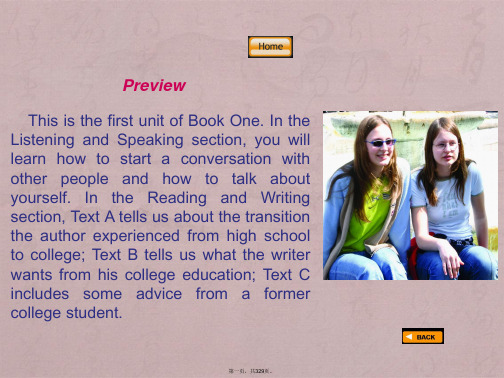
第十页,共329页。
PREV.
NEXT
Time
Contents
Plan
complete English sentences or just phrases. If the students have difficulty doing this, the teacher should provide them with the following key words in English: beautiful campus, good library, teachers and classmates, the computer
people when meeting them for the first time; 2. understand the main ideas of Texts A, B and C, and master the
useful sentence structures and words and expressions found in the relevant exercises of the first two texts; 3. know clearly how to use the present simple and past simple tenses of English; 4. fill in a form with their personal information; 5. understand the main idea of an English paragraph and identify the topic sentence.
第十三页,共329页。
PREV.
NEXT
Time
Contents
21世纪大学实用英语第二册unit 1教案
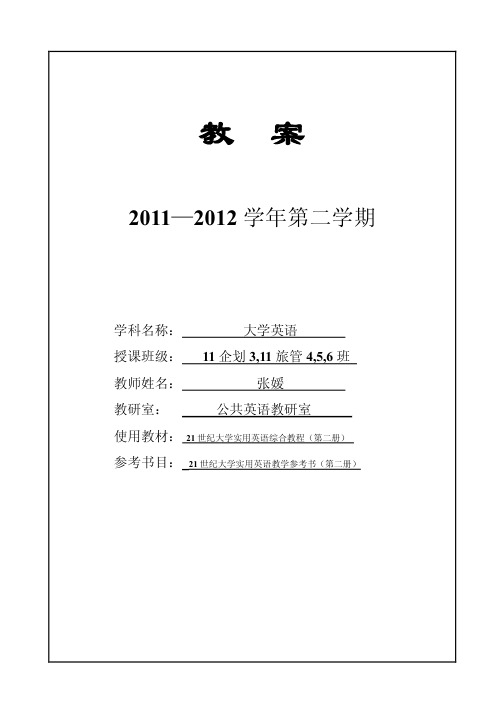
的目学教
01
时课总 1 TINU
元单一第
列序元单 称名元单
5
:snoitativni gnitirw rof senilediuG noitativni fo rettel a etirw ot woH
� �
)’51( 42~32 egap no rammarg tuoba esicrexE
)’51( noitaraperp gnitirw lacitcarP .3 �’03�gni-v :rammarG .2
)’06( noisneherpmoC B txeT .2
sesicrexE & B txeT
)’5( kcehc & weiveR.1
----------------------------------------------------------------------eraperp dna 格主立独 eht no emit erom tib a y ap ssalc retfA :.W.H )’3(krow emoH dna yrammuS .5 )’42( sesicrexE gnitirW .4 :rettel ruoy dne ot woH .)3( :stnemegnarra ruoy tuoba sliated reffo ot woH .)2( :rettel ruoy trats ot woH .)1( :snoisserpxE lufesU � B txeT rof
gnitirw & weiveR rammarG
�’3�pu-mraW .1
)’6( krow emoh dna yrammuS .7 )’03( noissucsiD .6 )’8( 8 esicrexe kcehc dna oD .5
Unit 1 21世纪大学实用英语
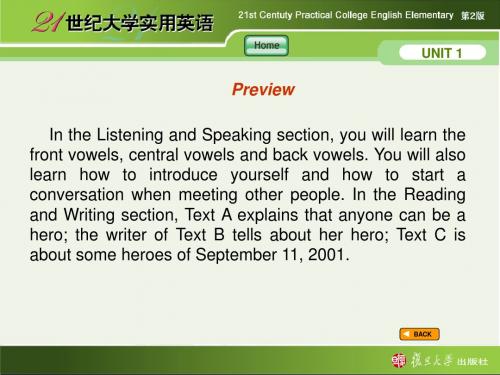
[ ] : [ ]
[ ] [ ] [ ]
PREV. NEXT
4. You’d better do it faster.
5. A funny couple wants some money.
UNIT 1
6. 7. 8. 9.
A friend in need is a friend indeed. Tom is as thin as a pin. Catch that mad cat. Better late than never.
[ i: ]
[]
[ ]
[e]
[ ] :
PREV. NEXT
10. It is half past one.
UNIT 1
Listen to the following sentences and underline the word you hear in each sentence.
KEY
1. Do you see the (sheep / ship ) over there? 2. After (working / walking ) for two hours, we were tired.
KEY
KEY
3. Black coffee tastes (better / bitter ).
KEY
4. He said it was a ( hard / hot) year.
PREV. NEXT
UNIT 1
KEY
5. Football is a good ( sport / spot) for you. 6. Mary’s (dead / dad ) is still working. 7. This ( word / world) is very interesting.
21世纪大学实用英语综合教程课文翻译及课后习题答案unit1
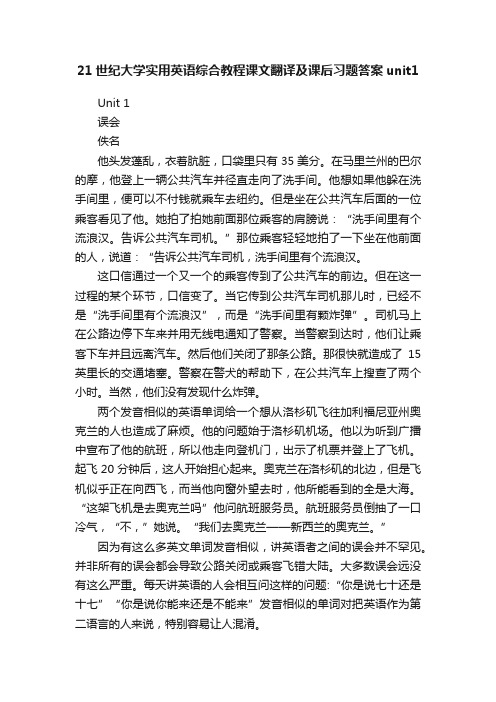
21世纪大学实用英语综合教程课文翻译及课后习题答案unit1Unit 1误会佚名他头发蓬乱,衣着肮脏,口袋里只有35美分。
在马里兰州的巴尔的摩,他登上一辆公共汽车并径直走向了洗手间。
他想如果他躲在洗手间里,便可以不付钱就乘车去纽约。
但是坐在公共汽车后面的一位乘客看见了他。
她拍了拍她前面那位乘客的肩膀说:“洗手间里有个流浪汉。
告诉公共汽车司机。
”那位乘客轻轻地拍了一下坐在他前面的人,说道:“告诉公共汽车司机,洗手间里有个流浪汉。
这口信通过一个又一个的乘客传到了公共汽车的前边。
但在这一过程的某个环节,口信变了。
当它传到公共汽车司机那儿时,已经不是“洗手间里有个流浪汉”,而是“洗手间里有颗炸弹”。
司机马上在公路边停下车来并用无线电通知了警察。
当警察到达时,他们让乘客下车并且远离汽车。
然后他们关闭了那条公路。
那很快就造成了15英里长的交通堵塞。
警察在警犬的帮助下,在公共汽车上搜查了两个小时。
当然,他们没有发现什么炸弹。
两个发音相似的英语单词给一个想从洛杉矶飞往加利福尼亚州奥克兰的人也造成了麻烦。
他的问题始于洛杉矶机场。
他以为听到广播中宣布了他的航班,所以他走向登机门,出示了机票并登上了飞机。
起飞20分钟后,这人开始担心起来。
奥克兰在洛杉矶的北边,但是飞机似乎正在向西飞,而当他向窗外望去时,他所能看到的全是大海。
“这架飞机是去奥克兰吗”他问航班服务员。
航班服务员倒抽了一口冷气,“不,”她说。
“我们去奥克兰——新西兰的奥克兰。
”因为有这么多英文单词发音相似,讲英语者之间的误会并不罕见。
并非所有的误会都会导致公路关闭或乘客飞错大陆。
大多数误会远没有这么严重。
每天讲英语的人会相互问这样的问题:“你是说七十还是十七”“你是说你能来还是不能来”发音相似的单词对把英语作为第二语言的人来说,特别容易让人混淆。
一天早晨,一位生活在美国的韩国妇女到上班地点时,她的老板问她:“你拿到盘子了吗” “没有……”她回答说,心里却在纳闷,不知道他到底是什么意思。
21世纪大学实用英语综合教程(第二册)课文翻译及课后习题答案unit 1
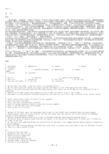
3. until they have finished their speeches
4. until my teacher explained them in class with several examples
5. until I saw Sam Ward leave the building
thorough (彻底的)。
还有一些完全没有道理的词,如:
1. “corned beef”(咸牛肉)中的“corn”( “玉米”) 在哪里?
2. “eggplant”(“茄子”)中的“egg” (“蛋”) 在哪里?
3. 为什么“grapefruit”(“柚子”)不是“fruit from the grape”(“葡萄的果实”)?
15
1. Take a look 2. get right 3. objected to 4. at least 5. makes no sense
6. beside himself 7. dawn on 8. think of
�
do(做)— dew(露水),
red(红的)— read(读过),
ate(吃过)— eight(八)。
为什么我们有拼写相同但发音不同、意义也不同的词?看看这些词中你能读对几个?
1. 比利将把自己的礼物赠送给汤姆。
2. 我反对把那样东西留在这里。
3. 我估计这一估计数会太高。
答案
5
1. passengers 2. immediately 3. similar 4. wonder 5. continent
6. traffic 7. misunderstandings 8. common
21世纪大学英语1Unit 1 (1)

I. Discussions of some points in Warm-up. ▲ Time to get a move on. (translation) ▲ ... if your mom were here, ... sorority. (grammar) ▲ ... right by your side every step of the way
It makes you wonder about the effect on men's behaviour.
这让人怀疑其对男性行为的影响。 It's a wonder that it took almost ten years. 这差不多用了10年的时间,真是桩奇事。
Dr Williams describes it as a potential wonder drug 威廉斯医生称其可能会成为特效药。
• ▲ straight adj. 直的; 连续的; 直率的; 整齐的
adv. 直地; 直接地; 坦率地; 立即
Examples: He finished his conversation and stood up, looking
straight at me. 他说完话站起来,直视着我。
We'll go to a meeting in Birmingham and come straight back. 我们将去伯明翰参加会议,然后马上回来.
• Look and talk
Directions: There are a few pictures here. Please watch, think, and talk about them .来自•Text A
A Day in the Life of a College Student
21世纪大学实用英语-(U版)Unit1
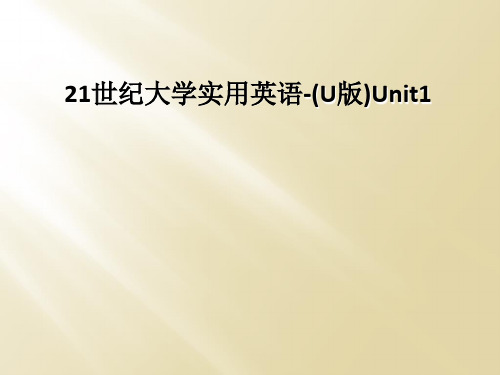
4) Para. 6
i. Questions:
1. What did he think of his future at that time?
2. What does the expression “this important hurdle in my life” mean?
ii. Language points
say, whenever that happens.
ii. Language Points ---Words and Phrases
perspective: n. a way of looking at things and forming a judgment.
e.g. The Table 1 below gives some perspective of this.
succeed: vi. do what one is trying to do; achieve the desired end.
e.g. If you can learn, you can succeed in school. If you try hard, you will succeed.
e.g. His routine work is to rub the coal through
a sieve. look upon/on: regard(sb.or sth.) in the
specified way. e.g. They look upon it quite as their own, I dare
be off: leave or be away. e.g. I must be off now. (I must leave now.)
- 1、下载文档前请自行甄别文档内容的完整性,平台不提供额外的编辑、内容补充、找答案等附加服务。
- 2、"仅部分预览"的文档,不可在线预览部分如存在完整性等问题,可反馈申请退款(可完整预览的文档不适用该条件!)。
- 3、如文档侵犯您的权益,请联系客服反馈,我们会尽快为您处理(人工客服工作时间:9:00-18:30)。
iii. Topic sentence:
when I first entered college...do well in my studies.
2) Para. 2
i. Question: What did the writer have to do in
1. Intensive tions:
1.What was the writer afraid of when he first became a college student? 2.He was afraid that he was not able to do well in his studies. He was
order to do well in his studies?
He had to set a study program.
ii. Language Points:
Words and Phrases:
be up to: be left to (sb.) to decide. e.g. It’s up to you to make the desion.
e.g. The Table 1 below gives some perspective of t his.
turn out : prove to be e.g.
Unfortunately they do not turn out to be more creative; they only feel that way.
regulate: vt. control (time, speed, etc.) so that it functions as desired. e.g. regulate one’s life. /Regulate the temperature of a room.
spend time (in) doing sth.: use time doing a particular thing. e.g. Tom spent an hour (in) reading.
These questions I had to answer for myself.
I soon learned that my life was now up to me.
i. Questions:
1. What mistakes did the author make at first?
set up: establish e.g. He set up in that way an alternative form of quan tum mechanics.
routine: n. fixed and regular way of doing thing.
e.g. His routine work is to rub the coal through
in store: about to happen; waiting e.g.
We solved this problem by developing time machines that let u s travel to the future to see what was in store for us.
e.g. It’s difficult for a small country to compete against/with big countries.
smart: a. clever. e.g. Jim is smart and always gets the highest grades.
ii. Language Points:
Words and Phrases: enter: vt. go or come into (a place).
e.g. enter a room/a house. The train has entered the railway station.
do well: be successful, especially in work or business. e.g. Tom is doing very well at work.
a sieve. look upon/on: regard(sb.or sth.) in the
specified way. e.g. They look upon it quite as their own, I dare say,
whenever that happens.
perspective: n. a way of looking at things and forming a judgment.
succeed: vi. do what one is trying to do; achieve the desired end.
e.g. If you can learn, you can succeed in school. If you try hard, you will succeed.
2. What happened to him shortly after?
3. How did the writer begin to see himself as a result?
have sth. under control :have sth. managed, dealt with, or kept in order successfully. e.g. We have everything under control, Governor.
Sentence patterns:
I had to regulate the time (that) I spent studying and the time (that) I spent socializing.
I had to decide when to go to bed, when... and with whom to be friendly.
make friends with: become friendly with sb. e.g. He made friends with an old worker.
compete: vi. try to win sth. by defeating others who are tying to do the same.
hurdle: n. difficulty to be overcome; obstacle
e.g. You are your greatest resource and your biggest hur dle…. all at the same time!
I had made the transition from a person dependent on my family for emotional support to a person who was responsible for myself.
I guess that this is all part of what people call “growing up”.
i. Questions:
1. What did he think of his future at that time?
2. What does the expression “this important hurdle in my life” mean?
How did you feel when you first got to this college?
Name three things that you felt excited and three things you felt worried about when you first got to this college
21st Century Practical College English
Unit1
College–A transition Point in my life
Colleges and Universities
Universities and colleges are schools that continue a person’s education beyond high school. A university or college education helps men and women enjoy richer, more meaningful lives. It prepares many people for professional careers as doctors, engineers, lawyers, or teachers. It also gives a person a better appreciation of such fields as art, literature, history, human relations, and science. Universities differ from colleges in that they are larger, have wider curricula, are involved in research activities, and grant graduate and professional as well as undergraduate degree.
keep up with: move or progress at the same rate as. e.g. I has to walk fast to keep up with him.
Sentence patterns:
Here I was surrounded by people (whom) I did not know and who did not know me.
